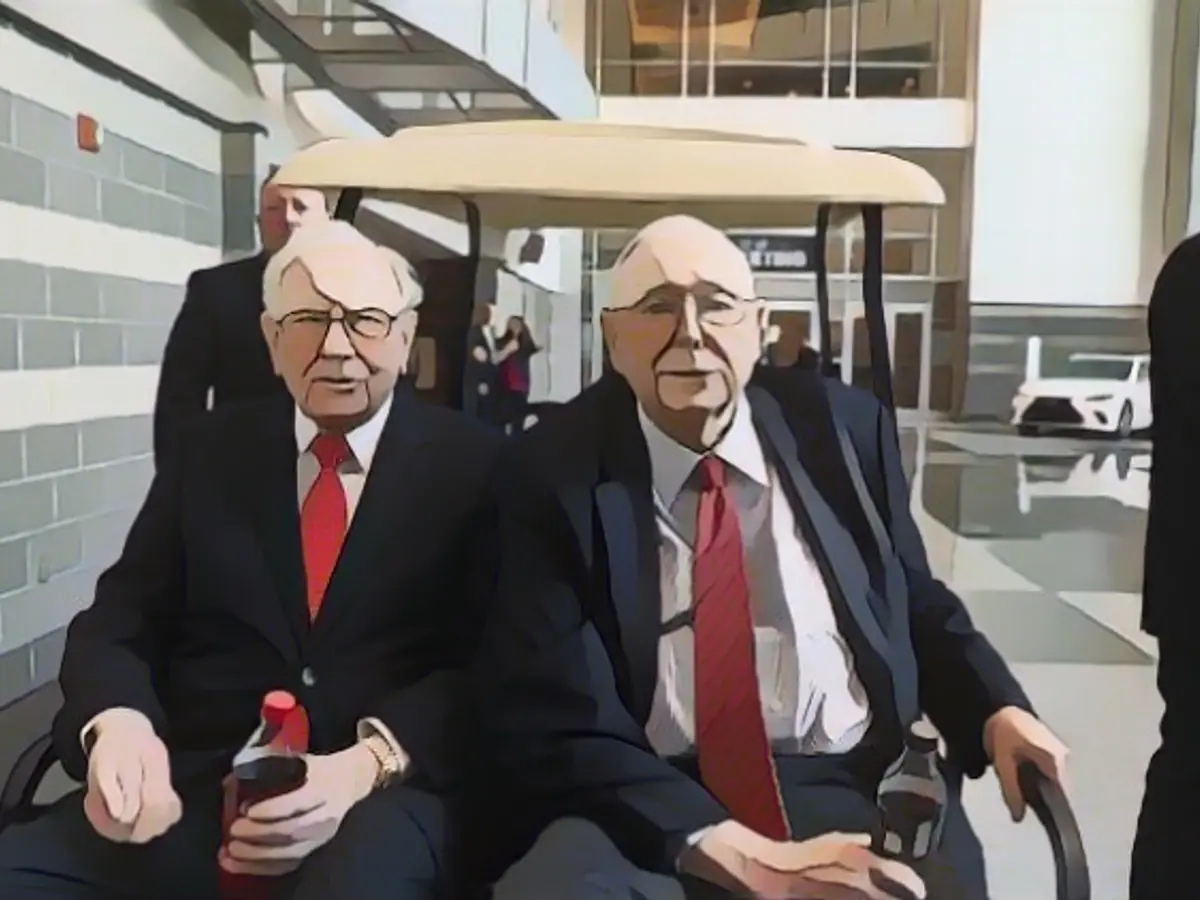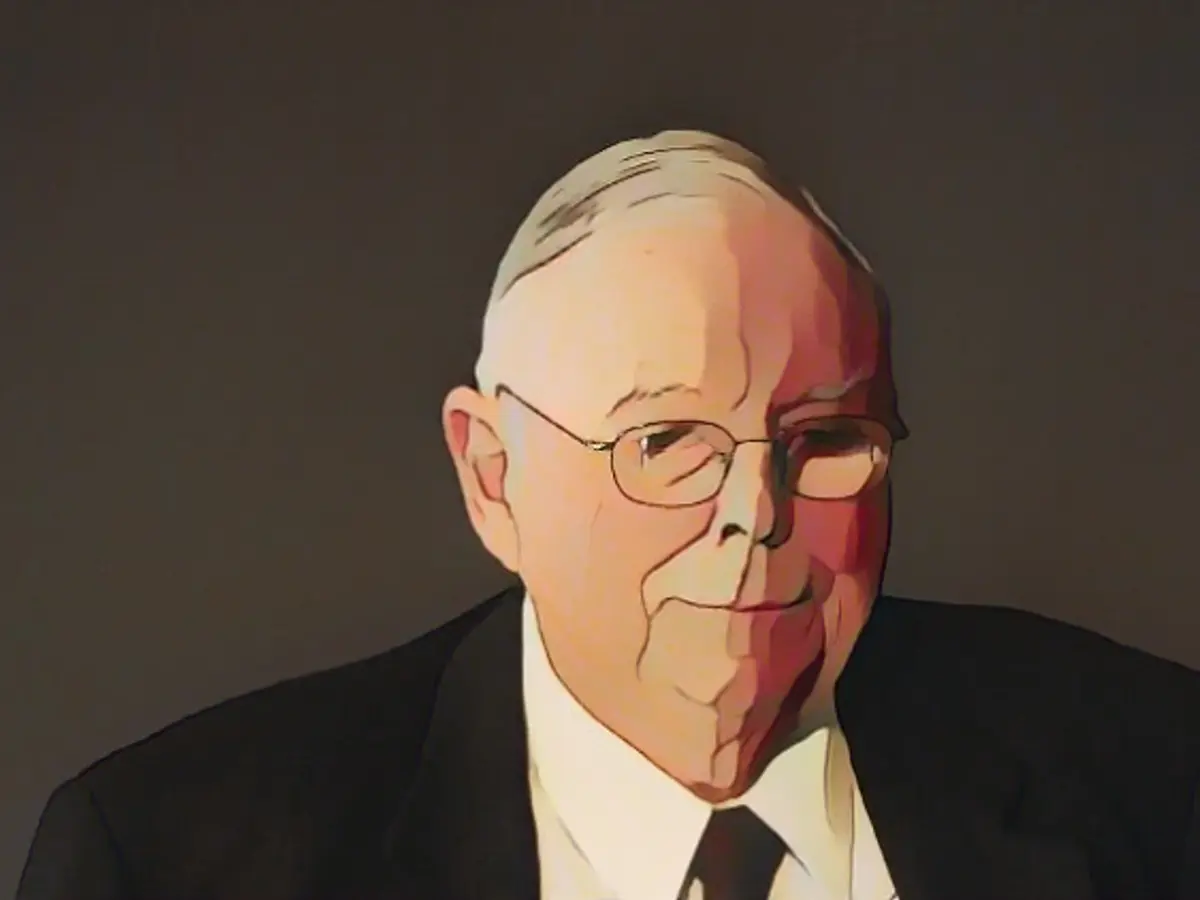"Charlie" Munger - the rich man who conquered envy
Warren Buffet may be the public face of Berkshire Hathaway. But without his right-hand man Charles Munger, the investment company's success would never have been possible. The power investor with a different relationship to money died at the age of 99.
The global investment community has lost a shining light. "Charlie" Munger, the visionary Vice President of the investment company Berkshire Hathaway and Warren Buffett's closest companion, has died at the age of 99 in a hospital in California.

Although Munger was formally "only" the second man at Berkshire, he never stood in Buffett's shadow. This was also due to the fact that Munger was much more than just his "alter ego", as he was often referred to. The two men complemented each other perfectly - but were still fundamentally different. Munger was always more cosmopolitan and had better social antennae, admirer Hendrik Leber from the asset management company Acatis tells ntv.de. Even if Munger was never an enthusiastic media man like Buffett, he had his fan base.
One of his great strengths was his ability to keep a low profile, he didn't always have to hear himself talk. Provided their mindsets matched, he got on with business partners in just a few words - even with Buffett, who once said they could go through a four-page memo together on the phone in three grunts. It became a running gag that Munger would say "I have nothing to further add" after Buffett's remarks at the annual general meetings. Tren Griffin chose the quote as the title for his Munger biography in 2018, with stock expert Leber contributing the foreword.
"A living book on legs"
Munger's profound life experience and extraordinarily broad knowledge captivated his listeners, Leber recalls. "When a question was put to him, sometimes nothing came for a long time. But what followed was a speech ready to print." Munger's broad American accent and sometimes a heavier choice of words were the special touch.
Munger was well-read and remained thirsty for knowledge throughout his life. "You'd be amazed how much Warren Buffett reads - and how much I read too. My children think it's funny. They think I'm a living book on legs," he once said about himself. He also provided the explanation: "Throughout my life, I have never met a wise person who didn't read all the time."
He had respect for engineers and scientists, but was also interested in economics, psychology and philosophy. "If you only have a hammer, every problem looks more or less like a nail," he once summarized. Accordingly, he had little use for specialists. This approach became the formula for his business success.
Two men from Omaha: first meeting with Warren Buffett
His path into the investment world was not predetermined. Munger, who was born in Omaha in 1924 and was seven years older than Buffett, came from a family of lawyers. He studied mathematics for a short time, joined the army and switched to meteorology until - in keeping with family tradition - he graduated in law from the renowned Harvard University.
Munger came into contact with the Buffett family at a young age when he worked in the grocery store "Buffett & Son", which belonged to Warren Buffett's grandfather. However, Warren Buffett and Charlie Munger only met for the first time in 1959 in a restaurant in their home town of Omaha.
Initially, they only had a loose business relationship. However, the meeting left its mark in that it led to Munger following Buffett's example and entering the investment business. In 1962, Munger founded Wesco Financial, a mini version of Berkshire Hathaway. At the time, he was still running a successful law firm at the same time. He did not resign from the bar until 1965.
The common path for Munger and Buffett began in 1978, when Buffett merged his investment activities into Berkshire Hathaway under pressure from the US financial regulator SEC and Munger became Vice Chairman. A decision that established an exceptional partnership that would dominate the world of finance for more than four decades. Until the end, the two men are said to have exchanged ideas almost daily despite their advanced age.
Munger deserves credit for convincing Buffett of his investment strategy - not the other way around. In his early years, Buffett concentrated solely on "cigar-butt investments", i.e. undervalued stocks. Quality and growth prospects were secondary for him. Munger, on the other hand, was interested in high-quality companies and looked at competitive advantages. The symbiosis of both approaches is what makes Berkshire so successful.
Munger: Quality has its price
A "chocolate deal" is regarded as a key moment in their joint biography. According to Leber, Berkshire's investment in the US confectionery manufacturer "See's Candies" was a "Saul-Paul moment". Until then, Buffett had been a low-cost investor. However, Munger then convinced him that quality had its price. In the end, Buffett was prepared to pay 25 million US dollars for the purchase. Since the purchase, the investment has yielded billions in profits.
For all his acumen, Munger's instinct for new trends is legendary. As early as 2008, for example, he recognized the potential of e-mobility. "He was deeply convinced that incredible things could happen when two or three things came together," says Leber.
Munger's private life was not always easy. His first marriage ended in divorce, his second wife, whom he married in 1956, died in 2010, and his eldest son of seven died young of leukemia. Munger lost an eye due to medical malpractice, after which he could barely see. Despite this, Munger maintained strict discipline in every situation and kept the flag flying high, according to Leber.
Munger left behind wisdom and insights that resonate. These include his words on envy and greed. For Munger, it was envy that drove the world, not greed. He once said in an interview that he could not understand why people could not be happier with what they have.
"I don't envy anyone"
Although Munger was frugal throughout his life and never flaunted his wealth, he still had no problem spending money. He had "conquered envy in his own life", he emphasized several times. "I don't care what someone else has." Creating wealth was a means to an end for him. He wanted to be free and independent - both in business and in his private life. It was clear to him that the majority of investors did not share his attitude to money and wealth.
The power investor, lawyer, manager and patron of the arts Munger "only" had an estimated fortune of 2.6 billion US dollars at the end of his life. Buffett's, on the other hand, amounted to almost 120 billion dollars according to Forbes. He readily admits that he owes a lot to Munger and that he would be much poorer without him. Munger certainly still had more than enough to ensure that he lacked for nothing.
- Despite having a net worth of only $2.6 billion compared to Buffett's $120 billion, Munger never envied anyone's wealth and believed that wealth was a means to achieve freedom and independence.
- Warren Buffett credits Munger for convincing him of the importance of quality investments, moving Berkshire Hathaway away from its initial focus on low-cost "cigar-butt" stocks.
Source: www.ntv.de








